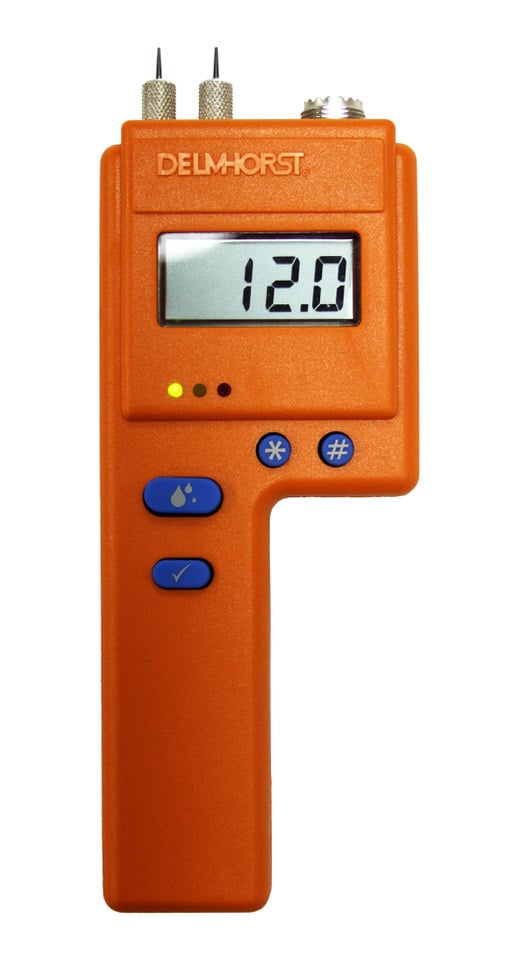How a Moisture Meter Can Assist You Keep Optimal Conditions in your house or Workplace
How a Moisture Meter Can Assist You Keep Optimal Conditions in your house or Workplace
Blog Article
The Ultimate Overview to Dampness Meters: A Comprehensive Introduction and How They Can Save You Cash
In the world of structure upkeep, building and construction, and different industries, the relevance of precisely measuring moisture degrees can not be overstated. Moisture meters act as essential tools in identifying and checking moisture web content in materials, assisting in avoiding costly problems and guaranteeing the quality of products. Recognizing the subtleties of various kinds of dampness meters, their applications, and the potential cost-saving advantages they use can be a game-changer for experts and businesses alike. Uncovering exactly how these devices can not just improve processes however likewise add to financial cost savings is a trip worth embarking on.
Kinds of Moisture Meters
One usual kind is the pin-type wetness meter, which gauges the electric resistance between two pins inserted right into a product. Pinless wetness meters, on the other hand, use electromagnetic sensing unit plates to check a bigger area without causing damages to the product's surface.

In addition, there are likewise specialty dampness meters designed for specific products like grain, dirt, or hay. These meters supply precise dampness analyses customized to the one-of-a-kind homes of the material being evaluated. Infrared moisture meters gauge the thermal properties of a material to identify its moisture material non-invasively, making them helpful for applications where pin or pinless meters might not be suitable. Recognizing the different types of wetness meters available can assist sectors choose one of the most ideal device for their particular wetness dimension requirements.

Benefits of Making Use Of Moisture Meters
Wetness meters offer vital benefits in accurately monitoring and evaluating wetness levels in varied products and environments (Moisture Meter). Among the primary benefits of using dampness meters is the prevention of potential damages triggered by excess moisture. By identifying and attending to high wetness degrees at an early stage, moisture meters assist to stop mold and mildew growth, rot, and structural damages in buildings, conserving both money and time on repair work. Additionally, wetness meters aid in making sure the quality of products during building or production processes. By accurately determining wetness content, these devices aid maintain the integrity of timber, drywall, concrete, and various other materials, reducing the danger of problems or failures.
Additionally, using wetness meters can cause enhanced power performance. By recognizing areas with high wetness degrees, such as leakages or inadequate insulation, adjustments can be made to improve energy conservation and reduce utility prices. In farming setups, moisture meters play an important duty in maximizing crop yields by making it possible for farmers to keep track of soil moisture degrees and make educated irrigation decisions. Generally, the benefits of using wetness meters span across different markets, supplying cost-efficient options and advertising far better top quality control techniques.
How to Select the Right Wetness Meter
When choosing a dampness meter, it's important to guarantee that the meter is appropriate for the details product you will certainly be screening. Different products have varying electrical buildings that can impact dampness readings, so picking a meter designed for your product is essential for exact results. By thoroughly assessing these elements, you can select a moisture meter that meets your needs and gives accurate dampness measurements for your jobs.
Correct Methods for Moisture Meter Usage

Expense Financial Savings Via Wetness Meter Applications
Exactly how can the strategic usage of dampness meters lead to significant cost savings throughout numerous sectors? In the agriculture market, dampness meters help in determining the optimal time for harvesting plants, preventing excess or over-drying moisture that can impact the final item's top quality.
In a similar way, in building, moisture meters aid stop pricey damages by identifying wetness levels in structure materials, such as timber or concrete, which can lead to architectural issues otherwise attended to quickly. By identifying problem locations beforehand, contractors can take rehabilitative steps to avoid extensive repair services or substitutes, ultimately saving time and cash.
Moreover, in the food handling industry, dampness meters are essential for checking product quality and making sure conformity with safety and security policies. By Learn More Here accurately measuring wetness material in food, suppliers can avoid putridity, maintain freshness, and next lower waste, leading to substantial cost financial savings. Generally, the critical application of dampness meters is a valuable investment that can lead to significant price reductions and boosted effectiveness throughout numerous industries.
Verdict
In final thought, wetness meters are beneficial devices for identifying and determining wetness levels in numerous materials. By making use of the best dampness meter and complying with correct techniques, individuals can properly prevent expensive problems triggered by excess wetness. Purchasing a quality wetness meter can result in substantial expense savings in the future by recognizing prospective problems beforehand and allowing prompt removal. Eventually, moisture meters are crucial instruments for keeping the stability and durability of products and address frameworks.
Dampness meters serve as vital tools in finding and keeping an eye on moisture material in materials, assisting in protecting against costly damages and ensuring the quality of products. Infrared wetness meters measure the thermal residential or commercial properties of a material to establish its moisture web content non-invasively, making them useful for applications where pin or pinless meters may not be suitable.Moisture meters use indispensable benefits in properly checking and analyzing moisture degrees in varied materials and atmospheres. In farming settings, moisture meters play a critical duty in optimizing crop yields by enabling farmers to keep track of soil moisture levels and make informed watering choices.In conclusion, moisture meters are beneficial devices for spotting and measuring dampness levels in various products.
Report this page